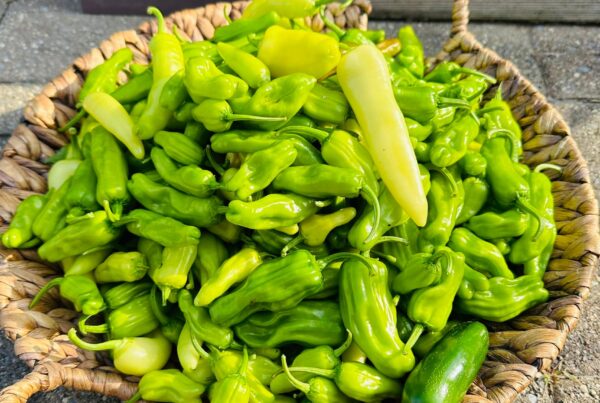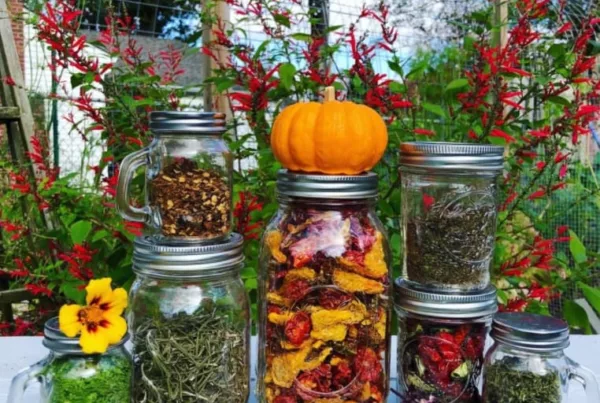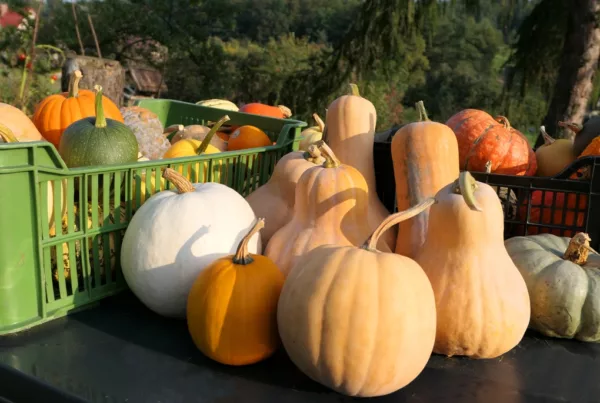Written by Kristina Hicks-Hamblin
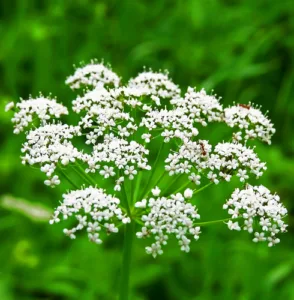
Anise flower.
When thinking of all the wonderful foods that can be grown in your Square Foot Garden beds, you may have overlooked one of the most flavorful: spices!
Although many commonly used spices such as cinnamon and ginger are tropical, there is a surprisingly large selection of spices that can easily be grown in temperate climates, and almost all of them can be direct sown into your Mel’s mix in spring.
And you can cultivate these in the same beds you use to grow crops like lettuce and tomatoes!
Here’s a selection of easy to grow spices for the Square Foot Garden:
1. Anise
Are you a licorice lover? Anise, also known as aniseed, is an annual, and a member of the carrot family grown for its licorice-flavored seeds.
Allow anise to flower and you’ll be harvesting seeds approximately 130 days after direct sowing.
All spices in the carrot family are harvested similarly, so keep reading for further instructions on collecting this spice!
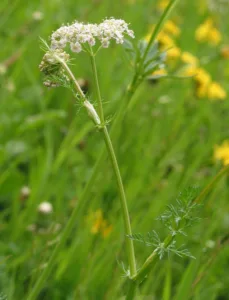
Caraway plant in flower. Photo by Robert Flogaus-Faust, via Wikimedia CC BY 4.0.
2. Caraway
Do you enjoy the distinctive flavor of rye bread? Another carrot relative, caraway is a plant whose pungent seeds are used to flavor rye bread, as well as Irish soda bread and sauerkraut.
As a biennial, this plant needs two seasons to produce seeds, so let it overwinter in your Square Foot Garden raised beds.
3. Cayenne
Are you the type who prefers to make meal time into an adrenaline-filled flavor adventure?
If you can grow sweet peppers in your raised beds, you can also grow your own supply of cayennes to grind into hot pepper!
Unless you live in a subtropical or tropical locale, you’ll want to start these seeds indoors and transplant them into your beds once the risk of frost has passed and after hardening off.
You’ll be ready to harvest cayenne peppers in around 90 days after transplanting, depending on the cultivar you choose.
To harvest, first allow these hot peppers to turn fully red before picking them. When ripe cut off the fruits with a bit of stem.
Next, place them on a drying rack in a warm location out of direct sun. Peppers will be brittle when fully dry. Either store whole, dry peppers in jars, or remove the stems, place in a blender, and pulverize to a powder.
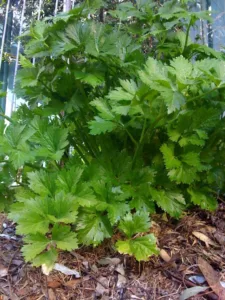
Celery plant prior to blooming. Photo by John Tann, via Wikimedia CC BY 2.0.
4. Celery Seed
As we’ve seen, relatives of the humble carrot tend to produce fragrant seeds, and celery is no exception!
Celery seeds impart a delicious flavor to potato salads, deviled eggs, and Bloody Mary cocktails, among other culinary creations.
This biennial will need to overwinter in your garden, as it only produces flowers and seeds the second year.
5. Coriander
Coriander joins the aromatic ranks of other carrot family spices. Its green leaves are sometimes referred to as cilantro, but some call this foliage coriander.
Coriander spice comes from the dried seeds of the cilantro plant. This spice is widely used in Indian and Latin American cuisine, brightening up both curries and chilies.
As an annual, coriander will produce a harvest of spice the first year, roughly 120 to 150 days after sowing.
6. Cumin
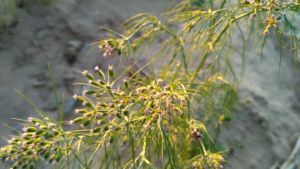
Cumin plant with unripe fruits. Photo by Raju Jangid, via Wikimedia CC BY-SA 4.0.
A spice that mixes beautifully with coriander, cumin is a cousin of celery and caraway, and is also used in Indian and Latin American cuisine.
With a characteristic, earthy aroma, cumin can be harvested the first year since this plant is an annual, with seeds ripening at around 115 days after sowing.
7. Dill Seed
Widely loved for its sprightly tasting green leaves, dill is also easily cultivated for its dry seeds to use as a spice.
Employed in pickle seasonings, soups, and rice dishes, dill seed brings a bright flavor wherever it is used.
These plants are annuals, and seeds will be ready to harvest in around 100 days.
8. Fennel
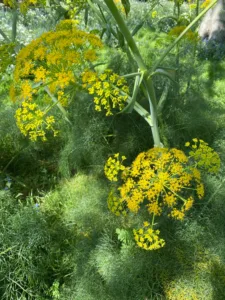
Fennel flower.
Chalk up one more aromatic win for the carrot family with fennel, whose seeds provide a mellower version of the licorice-like flavor found in anise.
This short lived perennial produces seeds either in year one or year two, depending on weather conditions – hotter weather can make plants bolt.
Relatives anise, caraway, celery, cilantro, cumin, dill, and fennel are all harvested in a similar fashion.
Umbrella shaped inflorescences made up of tiny flowers will form on these plants, emerging from long stalks. These flowers will give way to tiny green fruits, which are the unripe seeds you’ll eventually use as spice.
Allow these fruits to dry on the plant – the flower stalks and seed heads will turn brown. When dry, snip off the entire seed head and place them in a brown paper bag.
Keep the seed heads in the paper bag until the seeds are dry. You can test this by pressing a few with your fingernail. If there’s an indent when you press, they aren’t dry enough yet.
Once fully dry, remove from flower heads and store in jars in a cool, dark location.
9. Fenugreek
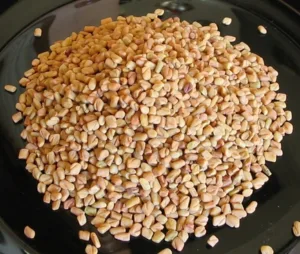
Fenugreek seeds. Photo by Humbads via Wikimedia CC Public Domain.
If you’re a fan of South Asian cuisine such as Indian cooking, you may be familiar with fenugreek. This spice has a sweet and slightly nutty flavor – and you can grow it in your Square Foot Garden!
Wait to sow this crop until after your last spring frost. This annual plant produces a harvest of seeds in 90 to 150 days after sowing.
In preparation for harvesting, first look for the formation of yellow, white, or purple flowers. Once flowers are spent, long thin pods will form.
As the plant dies back, turning yellow, the seeds in the pods will start to dry. When the pods are fully dry, collect them in a paper bag, then spread them out on a drying rack until dry.
Crush the seeds with a mortar and pestle as needed or grind them in a blender to create a powdered spice. Store this in a glass container in a cool, dark location.
10. Garlic
Garlic is certainly no stranger to most cook’s kitchens or most grower’s gardens. Yet you may have overlooked the potential to use this homegrown crop as a long keeping spice!
With pungent or mild flavors depending on the type, garlic is usually planted in late fall and harvested the following summer.
While the scapes of these plants can be used to adopt a low waste gardening strategy, the main crop is the garlic bulb. Individual cloves can be peeled, dehydrated, diced or ground into a powder, then stored in a jar on the spice rack.
Learn more about growing garlic in the Square Foot Garden – read our blog post!
11. Mustard Seeds
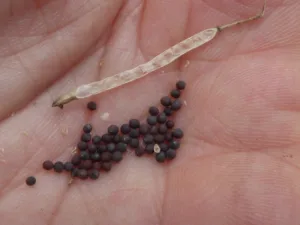
Mustard seeds need to be removed from their pod. Photo by Forest and Kim Starr, via Wikimedia CC BY 3.0.
You may not have realized it, but mustard, that condiment that pairs so well with ketchup, is created from crushing the seeds of the mustard plant and mixing them with vinegar.
Beyond their use for creating yellow-colored condiments, mustard seeds are also staples of Indian cuisine and pickling spices, where they impart a spicy and pungent flavor.
This is a fast growing spice, with mustard seeds ready for harvest in as little as 70 days.
Mustard seeds are formed in long, thin pods. Allow pods to dry on plants before harvesting, but try to pick them before the pods shatter.
Collect pods in a paper bag, then spread them in a single layer on a mesh drying rack. Once fully dry, remove the seeds from the pods and store them in a jar in a cool, dark location.

